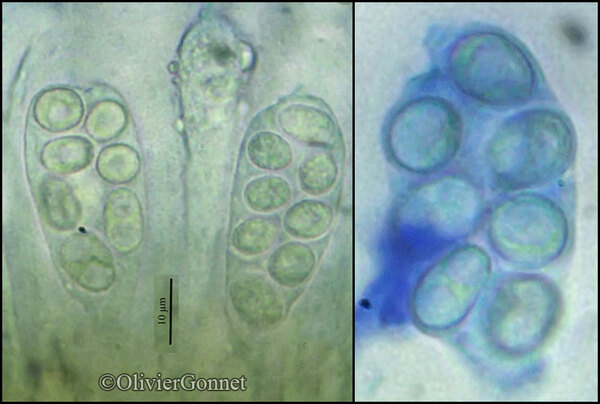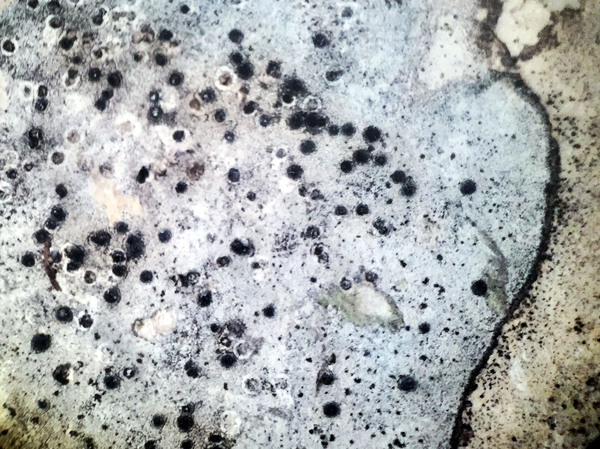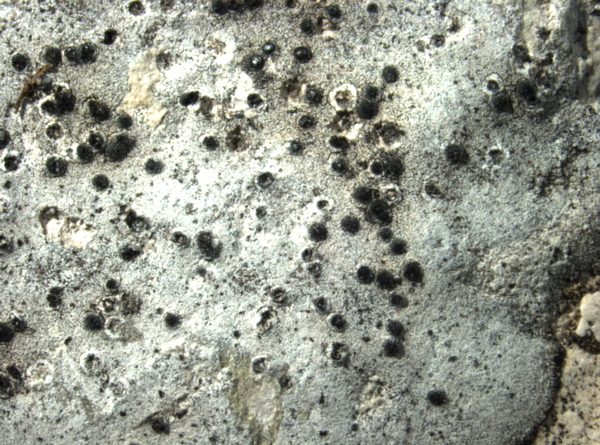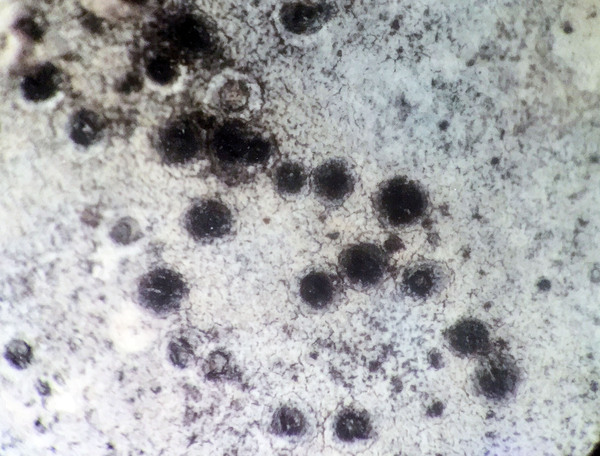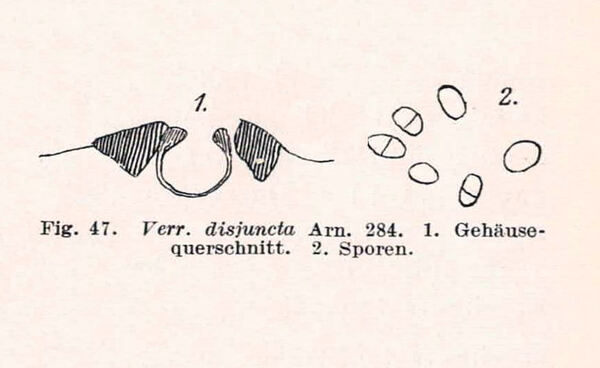Parabagliettoa disjuncta (Arnold) Krzewicka
Polish Bot. Stud., 27: 28, 2012. Basionym: Verrucaria disjuncta Arnold - Flora, 47: 599, 1864.
Synonyms: Clauzade & Cl. Roux nom. inval.; Lithocia tristis f. depauperata A. Massal.; Verrucaria tristis f. acrustacea Asta; Verrucaria tristis f. depauperata (A. Massal.) A. Massal.
Description: Thallus crustose, endosubstratic or very thinly episubstratic, bluish grey to brownish grey, sometimes poorly evident and appearing as densely scattered, minute brownish flecks, usually delimited from conspecific thalli by a dark prothalline line. Upper cortex a poorly delimited pseudocrotex; medulla prosoplectenchymatous, K/I+ violet (reaction best evident near the perithecia), without macrospheroids. Perithecia 1/3 to half immersed, often in clusters of 2-3, forming black projections which are sometimes surrounded by a thalline swelling at base, the apical part (0.4-)0.5-0.7 mm across, distinctly flattened, leaving shallow pits when they fall off. Involucrellum well-developed, disc-shaped, with the margin scarcely spreading downwards to the upper part of exciple, becoming progressively thicker in lower part, 80-150 μm thick at base; exciple 0.25-0.4 μm across, the wall dark brown in upper part, colourless at base, rarely colourless throughout; hamathecium of 25-35 μm long periphyses and periphysoids, interascal filaments absent; hymenial gel hemiamyloid, I+ red (I+ blue at very low concentrations of I), K/I+ blue. Asci 8-spored, clavate, I-, fissitunicate, the wall thickened above, with an ocular chamber, dehiscent by extrusion of an endotunica to form a delicate rostrum, Verrucaria-type. Ascospores 1-celled to (rarely) 1-septate, hyaline, broadly ellipsoid to globose, (8-)10-14 x (5-)6-8(-9) μm. Photobiont chlorococcoid. Spot tests: K-, C-, KC-, P-, UV-. Chemistry: without lichen substances.
Growth form: Crustose
Substrata: rocks
Photobiont: green algae other than Trentepohlia
Reproductive strategy: mainly sexual
Poorly known taxon in need of further study
Commonnes-rarity: (info)
Alpine belt: rare
Subalpine belt: rare
Montane belt: absent
Dry submediterranean belt: absent
Humid submediterranean belt: absent
Padanian area: absent
pH of the substrata:
1 2 3 4 5
Solar irradiation:
1 2 3 4 5
Aridity:
1 2 3 4 5
Eutrophication:
1 2 3 4 5
Poleotolerance:
0 1 2 3
Altitudinal distribution:
1 2 3 4 5 6
Rarity
absent
extremely rare
very rare
rare
rather rare
rather common
common
very common
extremely common
Loading data...
Occurrence data
Predictive map
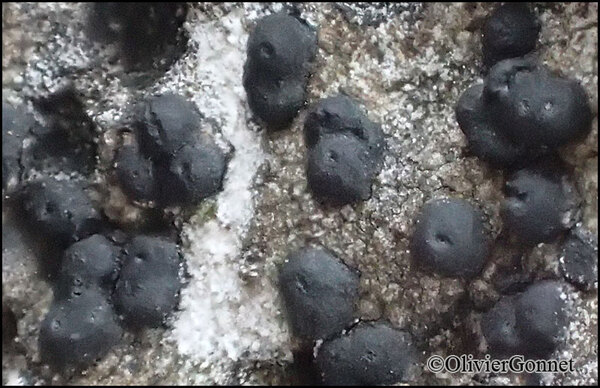
Courtesy Danièle et Olivier Gonnet - Source: https://www.afl-lichenologie.fr/Photos_AFL/Photos_AFL_V/Texte_V/Verrucaria_disjuncta.htm
France, 19/9/2015 - Villars-de-Lans, Vercors - Isère
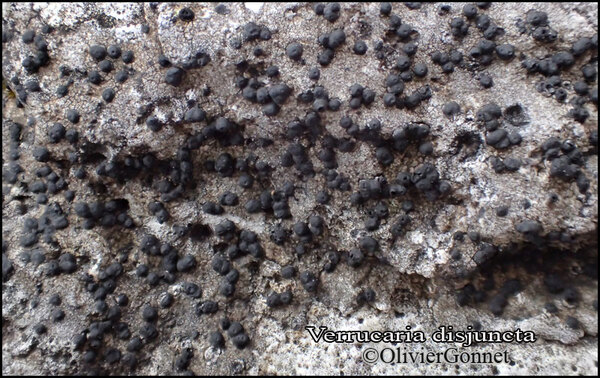
Courtesy Danièle et Olivier Gonnet - Source: https://www.afl-lichenologie.fr/Photos_AFL/Photos_AFL_V/Texte_V/Verrucaria_disjuncta.htm
France, 19/9/2015 - Villars-de-Lans, Vercors - Isère
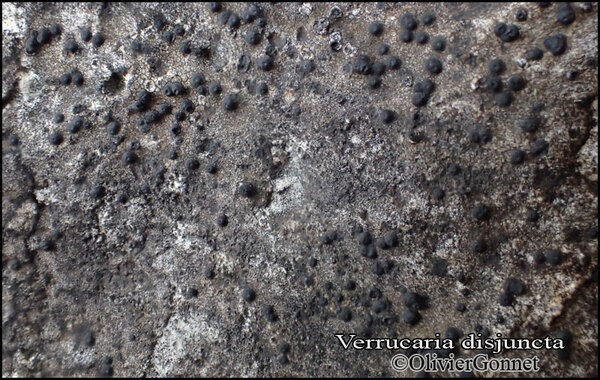
Courtesy Danièle et Olivier Gonnet - Source: https://www.afl-lichenologie.fr/Photos_AFL/Photos_AFL_V/Texte_V/Verrucaria_disjuncta.htm
France, 19/9/2015 - Villars-de-Lans, Vercors - Isère
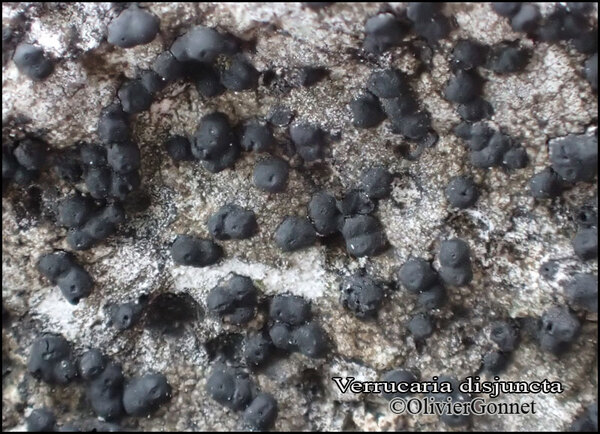
Courtesy Danièle et Olivier Gonnet - Source: https://www.afl-lichenologie.fr/Photos_AFL/Photos_AFL_V/Texte_V/Verrucaria_disjuncta.htm
France, 19/9/2015 - Villars-de-Lans, Vercors - Isère
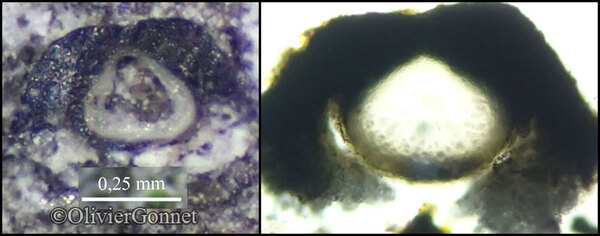
Courtesy Danièle et Olivier Gonnet - Source: https://www.afl-lichenologie.fr/Photos_AFL/Photos_AFL_V/Texte_V/Verrucaria_disjuncta.htm
France, 19/9/2015 - Villars-de-Lans, Vercors - Isère
Growth form: Crustose
Substrata: rocks
Photobiont: green algae other than Trentepohlia
Reproductive strategy: mainly sexual
Poorly known taxon in need of further study
Commonnes-rarity: (info)
Alpine belt: rare
Subalpine belt: rare
Montane belt: absent
Dry submediterranean belt: absent
Humid submediterranean belt: absent
Padanian area: absent
pH of the substrata:
| 1 | 2 | 3 | 4 | 5 |
Solar irradiation:
| 1 | 2 | 3 | 4 | 5 |
Aridity:
| 1 | 2 | 3 | 4 | 5 |
Eutrophication:
| 1 | 2 | 3 | 4 | 5 |
Poleotolerance:
| 0 | 1 | 2 | 3 |
Altitudinal distribution:
| 1 | 2 | 3 | 4 | 5 | 6 |
Rarity
absent
extremely rare
very rare
rare
rather rare
rather common
common
very common
extremely common
Loading data...
Occurrence data
Predictive map

Courtesy Danièle et Olivier Gonnet - Source: https://www.afl-lichenologie.fr/Photos_AFL/Photos_AFL_V/Texte_V/Verrucaria_disjuncta.htm
France, 19/9/2015 - Villars-de-Lans, Vercors - Isère

Courtesy Danièle et Olivier Gonnet - Source: https://www.afl-lichenologie.fr/Photos_AFL/Photos_AFL_V/Texte_V/Verrucaria_disjuncta.htm
France, 19/9/2015 - Villars-de-Lans, Vercors - Isère

Courtesy Danièle et Olivier Gonnet - Source: https://www.afl-lichenologie.fr/Photos_AFL/Photos_AFL_V/Texte_V/Verrucaria_disjuncta.htm
France, 19/9/2015 - Villars-de-Lans, Vercors - Isère

Courtesy Danièle et Olivier Gonnet - Source: https://www.afl-lichenologie.fr/Photos_AFL/Photos_AFL_V/Texte_V/Verrucaria_disjuncta.htm
France, 19/9/2015 - Villars-de-Lans, Vercors - Isère



